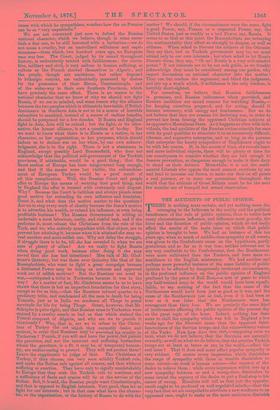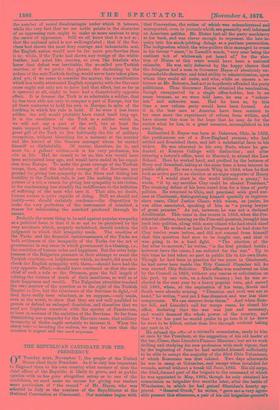THE ACCIDENTS OF PUBLIC OPINION. T HERE is nothing more certain,
and yet nothing more dis- couraging to the believers in the reality and the political beneficence of the rule of public opinion, than to noticehow many circumstances influence, and influence most gravely, the force and the direction of public opinion, which do not really affect the merits of the main issue on which that public opinion is brought to bear. We had an instance of this ten years ago, when so much of middle-class sympathy at all events, was given to the Confederate cause on the hypothesis, partly gratuitous, and so far as it was true, neither relevant nor in any way creditable to the Confederates, that the Southerners were more cultivated than the Yankees, and bore more re- semblance to the English aristocracy. We had another and perhaps more powerful instance of the same liability of public opinion to be affected by dangerously irrelevant circumstances, in the profound influence on the public opinion of England produced by the panic of Bull Run,—a sort of panic to which any half-trained army in the world would have been equally liable, to say nothing of the fact that the cause of the Northerners would have been just as good as it was, and the cause of the Southerners just as bad, even if it had been as true as it was false that the Northerners were less courageous than their foes. We see precisely the same kind of irrelevancies affecting the public opinion of the present day on the great topic of the hour. Indeed, nothing has done more to chill the sympathy which was felt in England a few weeks ago for the Slavonic cause than the apparent faint- heartedness of the Servian troops and the extraordinary valour of the Turks. New_how_doee dtia fact,—supposing even we held, what we a-a not believe, that the Servians are naturally cowardly, as well as, what we do believe, that the genuine Turkish troops are at least as brave as any in the world,—affect the real issue ? That it does and must affect popular sympathy is very evident. Of course every impression which diminishes the range of sympathy with those in trouble diminishes to some extent—so weak is human nature—the urgency of the desire to relieve them ; while every impression which sets up a new sympathy between us and a wrong-doer, diminishes to some extent the urgency of the desire to put a final stop to his career of wrong. Moralists will tell us that just the opposite result ought to be produced on well-regulated minds,—that the very fact that we are compelled to attribute a new weakness to an oppressed race, ought to make us the more anxious to diminish the number of moral disadvantages under which it labours, while the very fact that we see noble points in the character of an oppressing race ought to make us more anxious to stop the career of oppression. Still we all know that it is not so ; that the national mind is not well-regulated ; that if the Ser- viette had shown the most fiery courage and indomitable zeal, the English nation would now be far more pro-Servian than it is ; while, if the Turks had shown any vestige of the white- feather, had acted like cravens, or even like fatalists who knew that defeat was inevitable, the so-called pro-Turkish reaction, or if we prefer the phrase, the slackening in the ardour of the anti-Turkish feeling, would never have taken place. And yet, if we come to consider the matter, the consideration which has really attenuated English sympathy with the Slavonic cause ought not only not to have had that effect, but so far as it operated at all, ought to have had a diametrically opposite effect. It is because the Turk is so admirable a soldier, that he has been able not only to conquer a part of Europe, but for all these centuries to hold his own in Europe, in spite of the loathing in which his rule is held. If he were a less brave soldier, the evil would probably have cured itself long ago. It is the excellence of the Turk as a soldier which is, we will not say a part of the evil, but at least the main support and buttress of the evil. It has been the great gift of the Turk to live habitually the life of military occupation, without blenching for a moment at the number and the hatred of the Giaours amongst whom he carried himself so disdainfully. Of course, therefore, he is, and must be, a gallant soldier,—it is his very profession, his 9.41e in life. Had he ceased to be so, this war would have been anticipated long ago, and would have ended in his expul- sion from Europe. To make the great courage of the Turkish troops, then, and the inferior courage of the Servians, any ground for giving less sympathy to the Slays and feeling less hostility to the Turkish rule, is just like making the satirical powers of a wit, a reason for giving less sympathy to his victim, or for condemning less steadily the indifference to the infliction of suffering of the man who uses it. That also, no doubt, human nature is quite capable of doing. Still we should not justify—we should certainly condemn—the disposition to make the very perfection of the instrument of mischief, a reason for extenuating the mischief produced through its means.
Probably the worst thing to be said against popular sympathy as a political force is that it is so apt to be paralysed by the very accidents which, properly understood, should confirm the judgment to which that sympathy tends. The cruelties of the Turks and the financial embarrassments of the Turks are both evidences of the incapacity of the Turks for the art of government in any sense in which government is a blessing, i.e., the condition of human order and happiness. But the utter help- lessness of the Bulgarian peasants in their attempt to resist the Turkish cruelties,—a helplessness which, no doubt, did much to check the English sympathy with them,—should have had the very opposite effect,—should have convinced us that the mis- chief of such a rule as the Ottoman, goes the full length of robbing the victims of much of their manliness, as well as of their happiness and wealth. The Bulgarian atrocities touched the very marrow of the question as to the right of the Turkish Empire to live, but the reluctance of the Servians to fight,—if they have really been reluctant, as we suppose,—only tends, even at the worst, to show that they are not well qualified to govern or defend an enlarged dominion, and therefore that we need not frighten ourselves with the spectre of Panslavism, at least on account of the ambition of the Servians. So far from diminishing our sympathy for the Slavonic cause, that military incapacity of theirs ought certainly to increase it. When the sheep take to Invading the wolves, we may be sure that the occasion is urgent and the Linea nprme.



































 Previous page
Previous page